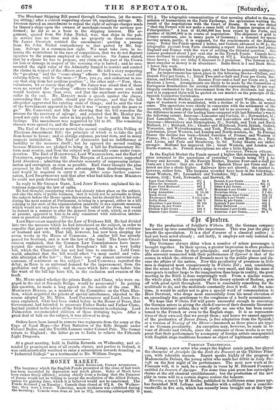(Ottarto.
By the production of Schiller's Wilhelm Tdl, the German company has soared up into something like importance. This was just the play to benefit the speculation. It is a chef d'oeuvre of a classical author it had not been acted already ; and lastly, it employs not only isolated in- dividuals but masses.
The Germans always shine when a number of minor personages is brought together. In their operas, a greater impression is often produced by their chorus than by their principals ; and perhaps the most favour- able souvenir connected with their performance of Egmont is that of the scenes in which the citizens of Brussels meet in the public places and dis- cuss the affairs of the nation. Now this peculiarity of greatness in little men is displayed most conspicuously in Wilhelm Tell; and, considering that the arena of the St. James's stage is very small, and that the mass of insurgents is rather large to the imagination than large in reality, the great meeting in the Riitli is done surprisingly well. From a similar reason, the whole play, with the exception of the dreary episode of Rudenz, goes off with great spirit throughout. There is constantly something for the multitude to do, and the multitude constantly does it well. At the same time, it would be unfair not to give a special word of commendation to Herr Devrient, who drops most successfully from his usual elevation of an exceedingly fine gentleman to the roughness of a burly mountaineer. We hope that Wilhelm: Tell will prove successful enough to encourage the German actors in giving the chefs d'reuvre of their dramatic literature. As mere histrionic artists, they will startle no one who has been accus- tomed to the French or even to the English stage. It is as representa- tives of their own soil that we accept them ; and hence we cannot approve of the production of Donna Diana, (a free adaptation from the Spanish,) or a version of Taming of the shrew—inasmuch as those pieces are types of no German peculiarity. An exception may, however, be made in fa- vour of Hamlet and Othello, since the eminence of those works is so very great that their performance by a company of foreign artists unacquainted with English stage-traditions becomes an object of legitimate curiosity.


























 Previous page
Previous page